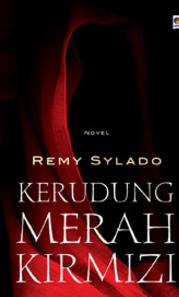 Kerudung Merah Kirmizi (The Dark Red Headscarf); By Remy Sylado; Kepustakaan Populer Gramedia Publisher, Jakarta (April 2002); 616 pp + iv; Rp 50,000
Kerudung Merah Kirmizi (The Dark Red Headscarf); By Remy Sylado; Kepustakaan Populer Gramedia Publisher, Jakarta (April 2002); 616 pp + iv; Rp 50,000
Darul Aqsha
JAKARTA
WOMEN and their integrity have been an endless inspiration for Remy Sylado, especially in his three most recent novels: Ca-Bau-Kan (1997), Kembang Jepun (2000) and now Kerudung Merah Kirmizi.
Set in Jakarta during the era of transition from the New Order government to ‘reformasi’ (reform), Kerudung Merah Kirmizi centers on the love story of an older couple, Myrnati Monika and Luc Sondakh.
Originally from Cianjur in West Java, Myrna is a widowed mother of two who takes a job as a singer in a nightclub after her pilot husband died in an airplane crash. Also a widower and the father of a student daughter, Luc is a professor who resides in Denpasar, Bali.
They wish to formalize their relationship in marriage, and Myrn gives Luc a memento of a dark red headscarf before he returns to Denpasar to prepare their nuptials.
Standing in the way of their happiness is Oom (Uncle) Sam, a Machiavellian businessman, who eyes Luc’s plot of land in Denpasar because he believes it is home to buried treasure left by Japanese troops during World War II. Sam does not hesitate to use unscrupulous
security officers, among them his younger brother Superintendent SSS, and thugs to reach his goals.
The novel flows with a blend of intrigue, romance, violence and heroics as Sam hatches his plan to get Luc out of the way.
The strength of the novel lies in the author’s broadminded view of the situation and also his deft ear for diction, using simple and lively words in the text.
Remy, who shows his empathy for different religions, releases his social criticism on local and national issues — he terms Jakarta “metro-kesetanan” (demonic city) for its lawlessness —
through Myrna’s monologue in the book’s prologue and epilogue.
He also embellishes the plot with a number of excerpts of lyrics of some classic western songs composed between 1930s and 1960s and Arabic poems of the classic Arab/Muslim and Sufi poets, such as Abu Nuwas, Abu’l A’la al-Ma’arri, Jalaludin Rumi and Michael Nu’aymah.
The book seems to have been rushed into print to capitalize on the success of Ca-bau-kan, which was recently made into a movie, and there is no explanatory foreword about the book’s background (it was originally serialized in Republika daily last year).
Still, Remy succeeds in giving a poignant and perceptive analysis of the lot of women in patriarchal Indonesian society, saying their roles are broken down into “nyonya-perempuan-wanita-istri-betina-ibu” (mistress-woman-lady-wife-female-mother).
He also issues a warning that now there are many young Indonesians living without mothers, for whatever reason. It’s a reminder of the words of American author Christian Nestell Bovee: “Next to God, we are indebted to women, first for life itself, and then for making it
worth having”.
On the shelves/The Jakarta Post
Sunday, June 02, 2002
‘Ca-Bau-Kan’, an Indonesian film based on Remy Silado’s novel:

